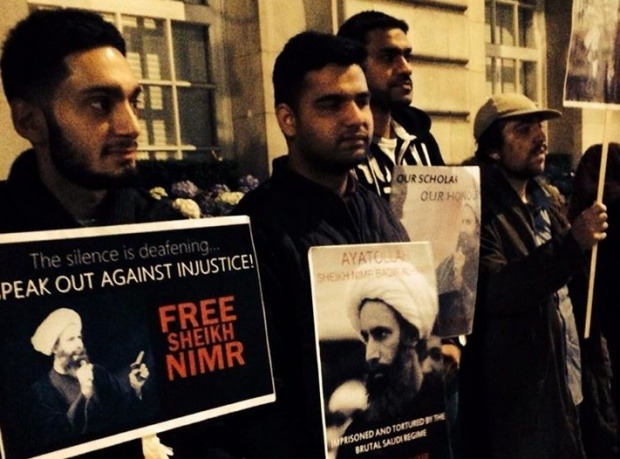Sheikh Al-Nimr is a leading Shia scholar who was convicted for his outspoken criticism of the Saudi monarchy and his calls for equality and reform. He was sentenced to death last year on trumped up charges of apostasy and terrorism.
IHRC has consistently campaigned for the release of the sheikh since he was detained in 2012 following a police pursuit in Eastern Province of Qatif district which ended with him being shot in the leg four times in disputed circumstances. Officials said he rammed a security forces vehicle, leading to a gun battle. However, his family disputed the allegation that he resisted arrest and insisted that he did not own a weapon.
The sheikh’s arrest came against the backdrop of rising public unrest and dissension in Saudi Arabia as the Arab Spring took hold across the Middle East. Street protests started in Jeddah, and soon afterwards other protests flared up throughout the country. All the protests demanded more liberty, constitutional changes and an end to anti-Shia discrimination.
Skeikh al-Nimr became a symbol of the uprising, and his arrest provoked an intensification of the protests calling for his immediate release resulting in an escalation of violence by the Saudi security forces. Human rights groups expressed concern at the time that he would not receive a fair trial.
IHRC’s letter, addressed to the Office of the High Commission for Human Rights, calls on the OHCHR to do all that is necessary to put pressure on the Saudi government to stay his execution and to secure his release. It states: “It is a severe blight on the reputation of this office if it is not able to work to protect the rights of individuals to free speech, to protest, to practise their religion, to a fair trial, to not be subjected to torture, and the right to life.”
The Specialised Criminal Court, Saudi Arabia’s terrorism tribunal, which sentenced Sheikh al-Nimr has been widely criticised for flagrant due process violations, including broadly framed charges that do not resemble recognisable crimes, and denial of access to lawyers at arrest and during pre-trial detention, making it almost impossible to prepare cases for trial. The court has also been criticised for dismissing without investigation allegations of torture and admitting as evidence confessions that defendants said were coerced.
According to a 2011 report compiled by IHRC, there are an estimated 30,000 political prisoners in Saudi Arabia out of a population of approximately 18 million Saudi nationals.
Notes to editors:
A copy of the letter sent by IHRC can be viewed here: https://ihrc.org.uk/activities/campaigns/11424-a-letter-regarding-sheikh-nimrbaqir-al-nimrs-execution
IHRC’s hard-hitting report into political prisoners, ‘Saudi Arabia’s Political Prisoners: Towards a Third Decade of Silence’, can be downloaded at https://ihrc.org.uk/attachments/article/9867/Saudi%20Report%20A4-v04.pdf
For media enquiries please email nadia@ihrc.org or call 020 8904 4222[Ends]
——————————————————————————————
IHRC is an NGO in Special Consultative Status with the Economic and Social Council of the United Nations.
Islamic Human Rights Commission
PO Box 598
Wembley
HA9 7XH
United Kingdom
Telephone (+44) 20 8904 4222
Email: info@ihrc.org
Web: www.ihrc.org
Twitter @ihrc







